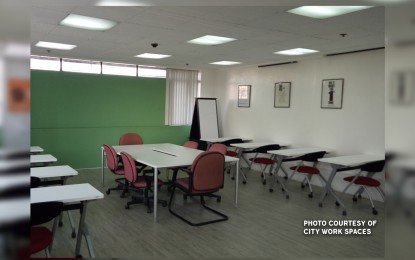
(File photo courtesy of City Work Spaces)
MANILA -- An official of a leading real estate services company forecasts a deficit in office spaces in Metro Manila as early as 2020 with the strong demand, especially coming from Philippine offshore gaming operators (POGO).
In a briefing Monday, Leechiu Property Consultants Chief Executive Officer David Leechiu cited that as of mid-September this year, the POGO industry has surpassed the information technology-business process management (IT-BPM) sector in terms of demand for office spaces.
He said more than one million square meters of office space demand was recorded nationwide to date, and 990,000 sq.m. or about 87% of the take-up was registered in Metro Manila.
Cebu came in second in terms of the take-up at 8%, 88,000 sq.m.; and Clark, Pampanga, 36,000 sq.m.
Of the total, 33% of the demand nationwide came from the POGO industry at 386,000 sq.m., higher than the 355,000 sq.m. demand from IT-BPM companies.
Demand from other industries accounted for the largest share at 35%.
Last year, office space demand from the IT-BPM industry hit 36%; POGOs, 24%; and other industries, 40%.
In terms of areas, Alabang and Bay City, along the stretch of reclaimed areas in the cities of Manila, Pasay, and Parañaque, have the lowest vacancy rate at 1% as of the first half of 2019.
These are followed by Makati City, 2%; Ortigas, Pasig and Mandaluyong, 3%; Taguig City, 8% percent; Quezon City, 9%; and Bonifacio Global City (BGC), 10%.
Demand in the pipeline for the next five years, starting the second half of this year, was placed at 3.54 million sq.m.
BGC posted the lowest vacancy rate to date at 52 percent and was followed by Taguig City, 63 percent; Makati City, 66 percent; Alabang, 67 percent; Bay City, 75 percent; and Ortigas, Pasig, Mandaluyong, 82 percent.
Leechiu said demand for office spaces from the POGO industry, which he said is not only from China but also from Australia and Europe, exceeded that of the IT-BPM in just about 30 months.
He said big demand was even noted when Cambodia banned online gaming thus, he forecasts demand from the sector to reach as much as 450,000 sq.m this year.
He forecasts about 15 to 20 percent of all office spaces pipeline until 2021 to be pre-leased “in a matter of a few weeks.”
“We expect a deficit in 2021 assuming things keep going the way they’re going. Even with the small slowdown in both sectors (POGO and IT-BPM), we will still hit a deficit as late as 2021. It could be as early as 2020,” he said.
Leechiu said that since major economies are expected to post recession in the near term, the real estate services firm’s clients are planning to adapt to this change by increasing offshore operations in the Philippines.
“(The) Philippines is only one of the two places in the world where they can scale at a level they need to scale globally and quickly. Only India and the Philippines can give them the scale of talent they need to be able to have a meaningful impact on their bottomline,” he said.
Leechiu also noted that demand from IT-BPM companies is expected to remain up in “another 10 years from here until, maybe, automation takes it away.”
He said adapting automation such as artificial intelligence takes time so companies “will keep sending jobs to the Philippines.”
“The Philippines is in such a sweet spot because of the IT-BPO (information technology – business process outsourcing) sector and the remittances,” he added. (PNA)
